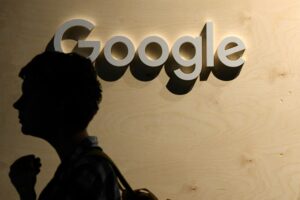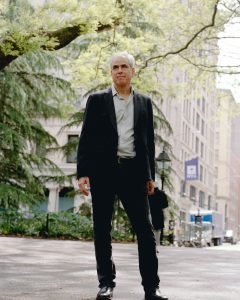If you think your new iPhone is a status symbol, prepare to be punked—or, rather, Punkt—by Benjamin Crudo’s dumbphone .
The chief executive of Diff, which makes software for online retailers, calls and texts from a 4.6-by-2-inch brick with buttons called a Punkt MP02. Send an email or Slack message and the 41-year-old Crudo won’t respond until he is in front of his computer.
“It definitely causes a bit of disruption because everybody around me is communicating in a certain way, and I’m choosing to communicate differently,” he says. “Lucky for me, I’m the boss.”
From vinyl records to analog watches , old technology is having a moment as people seek digital detoxes —or, at least, breaks from the dinging and buzzing of our always-connected lives.
For executives, even those getting rich from high tech, using stuff from the past can double as a power move. Junior employees may chafe at jumping through hoops to get hold of them, not to mention having to be reachable at all times themselves. But one of the perks of calling the shots is being able to make others wait or rely on assistants to alert them to truly urgent matters.
Throwback bosses say eschewing smart glasses or other state-of-the-art gizmos makes them better leaders. They can focus on deep work and be fully present in meetings. Plus, people in the know recognize low-tech gear can be pricey, too. Witness the stripped-down Light Phone III to be released next year at $799—the starting price of the newly unveiled iPhone 16 .
In practical terms, it’s hard to ditch modern tech entirely. Tom Patterson, co-founder of the Tommy John underwear brand, told me he ordered a dumbphone a few months ago hoping it would reduce his time spent on emails. But he hasn’t used it yet because he can’t quite bring himself to go back to texting on a T9 keypad.
Crudo, the software CEO, recognizes his job and habits seem incongruous. The way he sees it, technology is a valuable tool that ought to be put away when it isn’t needed. He uses a smartphone for driving directions and two-factor authentication at work, but his dumbphone is his primary device.
He checks email at 9 a.m., noon, 3 p.m. and 6 p.m. and not in between. Now, that’s luxury.
He says colleagues and customers know to call him for after-hours emergencies. The new dad might not pick up his dumbphone because he doesn’t keep it in his pocket during family time. But don’t worry—he forwards calls to his house phone and is sure to hear it ring.
More important, less accessible
Snap Chairman Michael Lynton traces his appreciation of old technology to a lunch with graphic designer Milton Glaser in the late ’90s. Lynton remembers gushing about how the internet would revolutionize everything. Glaser—who died in 2020 and is known for simple aesthetics, such as the “I ♥ NY” logo —wasn’t so sure.
“He said, ‘Look at the watch you’re wearing,’” Lynton recalls. The timepiece, a steel Rolex given by his parents many years earlier, is still on his wrist today.
Besides its beauty and freedom from notifications, the vintage watch has an advantage over many digital models: The minute hand’s gradual arc toward the top or bottom of the hour helps Lynton visualize how much time remains before his next appointment, and the face never goes to sleep.
Yes, glancing at your Rolex in a meeting is a classic boss move. The bigger point is one-function tools can remain useful long after they’re supposedly outmoded.
Which brings me to Lynton’s love of fax machines. Pause for a moment to appreciate the irony of a man who chairs the board of Snap—maker of a mobile app for trading disappearing messages—relying on paper and ink. He considers faxes more secure than emails, and who could blame the guy? He dealt with a massive cyberattack in 2014 as CEO of Sony , based in Japan, where fax machines remain more popular than in the U.S.
More than that, the novelty of a fax grabs people’s attention, he says. An important email can get buried in someone’s inbox. A message delivered via fax might be the only one a person receives this month…or decade. The only catch: The number of business contacts who still have fax machines is shrinking fast.
Humblebrag
Shay Sharon ’s teenage heroes were the TV doctors of “ER,” who sprang into action when their pagers went off. He dreamed of wearing his own beeper, even as some hospitals stopped using them. Now an oral and maxillofacial cancer surgeon, he finally got his chance on a recent fellowship at Boston Medical Center.
To the 44-year-old Sharon, the beeper has aged as gracefully as George Clooney —and even conveys a little star power. Since hardly anyone except doctors wears a pager anymore, people know what Sharon does for a living when he goes to the coffee shop.
“They see the pager and usually, if they greet you, they greet you with ‘Good morning, doctor,’” he says.
His ’90s relic is now a humblebrag. And he says he sleeps better with a pager on his nightstand. It’s hard to rest when he is on call with a smartphone because he startles at every text message and push alert, thinking it could be an emergency.
Sharon likes disconnecting so much that he recently started leaving his phone at home when he jogs. He now runs with a Sony Walkman and corded earbuds .
Write to Callum Borchers at callum.borchers@wsj.com











